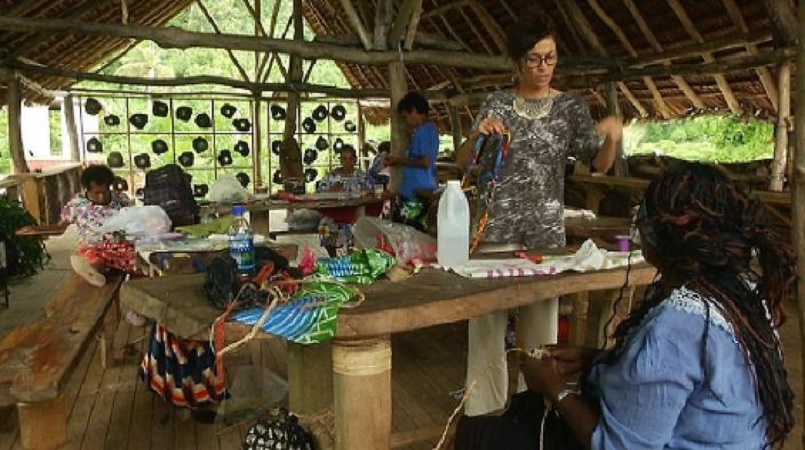
Tourism is a vital part of Vanuatu's economy -- and Australians are among the Pacific Nation's most loyal visitors.
SBS reports a new pilot project funded in part by the Australian government hopes to give the industry a boost -- by helping local producers reach more international buyers.
In the tropics, vegetation grows back fast.
Even so, it took six months for the sandalwood plantation Stevel Nilwo runs near Port Vila to return to full strength after Cyclone Pam hit in March 2015.
The plantation manager says his team rallied hard to save valuable plantings.
"We came in really quick, the boys were really into it, and after the cyclone the boys came in and cropped all the trees up. And as you can see now the results of those cropped trees. We were expecting to lose about 50 per cent but we were so lucky to lose less than10 per cent of the total trees."
The products Mr Nilwo grows for South Pacific Sandalwood are marketed at international tourists who visit Port Vila.
But the tourism industry, which generates about 40 per cent of Vanuatu's GDP, suffered after the category five cyclone.
Many visitors come by sea, and Vanuatu's Deputy Prime Minister Joe Natuman says though the cruise ship industry is vitally important, local operators don't always see a direct benefit.
"A lot of tourists - when they come - they already bought their tickets, their tour from abroad."
The International Finance Corporation (IFC) is the World Bank's private arm that encourages private sector investment in developing countries.
It has partnered with Australia and New Zealand to help products like cocoa, chocolate and handicrafts reach broader markets.
Dina Nicholas of the IFC says the project aims to boost the tourism industry as well as spread its profits to more remote parts of the country - areas that tourists may not often get to.
"So if you think about how we can use tourism - which is one of the largest sectors of economic activity in Vanuatu - how we can actually get tourism to reach the outer islands, this is a great way to do it because this is through supply chains."
That hammering you can hear is a woman pounding the coloured shape of a leaf onto a piece of fabric at a workshop in the capital Port Vila.
She and others have come from all over Vanuatu to learn how to make handicrafts from local products.
Anna Blessing from the island of Santo is one of the participants.
She's very happy to see the focus on locally-made products, and hopes it will catch on.
"Most of the things we sell to the tourists are Chinese-made. So having come to this workshop, wow! It makes a lot of difference with this lady who is teaching us to be creative in using the natural environment."
Cruising company P&O brings more than 140-thousand international tourists each year to Vanuatu.
Working with the IFC it has agreed to stock locally-made products on board some of its ships -- to increase opportunities for sales.
Sture Myrmell is the President of P&O Cruises.
"As cruising is growing in the region, the economic growth that comes with that is something that we want everyone to be part of."
The success of the project will depend on willing buyers.
Steve Nilwo of South Pacific Sandalwood is hopeful it will help boost sales.
"Well, actually, really, really happy to see that. Our products are going out and we are making more sales. It actually gives me a chance to bring in more Ni-vans to come and work up here.
Tess Newton Cain, the principal of the agency TCN Pacific Consulting and a long-term resident of Vanuatu, is more sceptical.
"I think there needs to be more done around market analysis. I think there's a lot of work being done by donors and NGOs and other people, around training people to make things to sell. I'm always concerned that that's not been underpinned by a business case that actually demonstrates that there's a demand, that it can be sold at the right price, that people can make money out of it, it is of sufficient quality, that people will want to pay for it and that it meets the market as the market is."
Dina Nicholas of the IFC admits the project is in the pilot stage, and time will tell if it proves successful for suppliers.
"As far as we know, certainly in this region, this has not been tried before. So we don't know how well things are going to sell. In the end, we need to have products on board that people want to buy."
TCN Pacific Consulting's Tess Newton Cain again.
"I definitely think that it's a good idea the tourism sector becomes an internal market for a wider range of goods and services that are produced locally, and this is one aspect of that. I don't think it can be the only aspect, I think there are other avenues to be explored."
Vanuatu's Deputy Prime Minister Joe Natuman is optimistic.
"When they come here, when they do spend -- this is what we want to encourage -- that more local products are available for tourists to be able to spend their money on."
